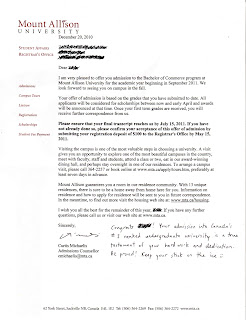The results of the study have led to the University of Saskatchewan adjusting their admission requirements for Alberta students. A few other universities are also looking at Alberta high school students more favourably, namely Carleton University, St. Francis Xavier, Wilfrid Laurier University and the University of British Columbia.
The study also confirms what many of us in admissions suspected or knew anecdotally – grade inflation is common and the best students come from Alberta high schools.
The best outcome from this study is that Alberta students may no longer be disadvantaged in university admissions and entrance scholarships across Canada not just at the five universities mentioned above.
However, I worry that the issue of grade inflation in the other provinces is tougher to tackle. If there is as much as a 20 percentage point decrease in marks, this suggest that students from British Columbia, Manitoba, Ontario and Saskatchewan need a 90% high school average to have at least 70% or B average in first year!
More analysis of the data or further study is required. The study suggests that grade inflation is province-wide in the provinces tracked, but are there variations between cities or school boards? Also what about the individual applicants? How would you feel if universities lower your high school average by a few percentage points causing you to not be offered admission or a scholarship? Is this not a vicious cycle, universities adjust grades which lead to higher cut-off averages which causes more grade inflation?
Perhaps universities are already taking grade inflation into consideration and this may explain why the admission averages in most universities are quite high. Also, since the vast majority of admission decisions in Canada (unlike in the US or UK) are determined solely on high school grades, the students with the highest marks will be offered admission and with supporting data grades should be adjusted for disadvantaged groups.
In an ideal world, universities will make data-based admission decisions not just for Alberta students but for everyone.
